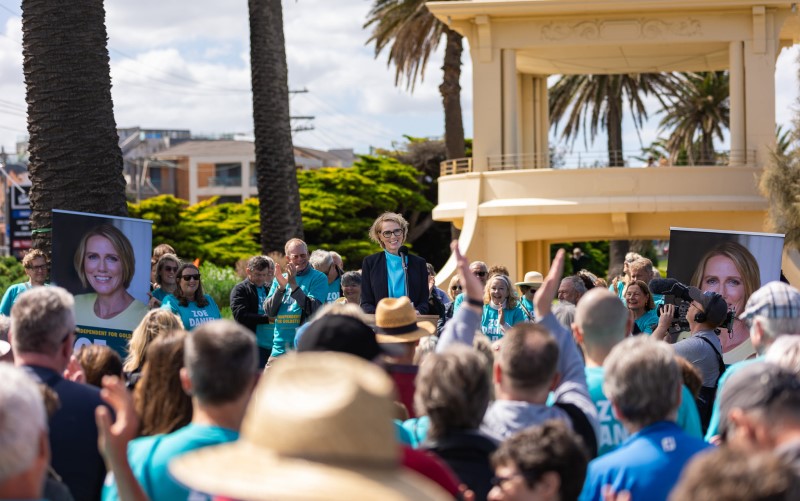Our democracy is damaged only progressive independents can repair it
December 3, 2021
Voter trust in the major political parties is virtually non-existent independent candidates can restore the grassroots values that have been abandoned.
Most voters are now so disenchanted with politics that they avoid identifying with the major parties. There is no trust in parties that have branches of minimal size in each electorate and are essentially controlled by faceless men from headquarters. Hence there is a huge rise in the number of independent candidates.
This is vital to the future of our democracy. We need MPs who travel widely in their electorates, discuss policy options with constituents and then propose policies that have grassroots support.
My focus is on my former electorate of Goldstein in Melbourne. The independent candidate there is Zoe Daniel, who for 30 years gathered vast experience as a journalist with the ABC in Australia and overseas. Daniel covered many issues that are still of great importance to Australian domestic and foreign affairs. I admired her objectivity and insights as she interviewed a vast array of people. What was most evident was that Daniel is a sincere listener. She doesnt talk over people or advance a conclusion that she might anticipate. She has released a video on her website that reveals the essence of her values and introduces us to her children and her role as a mother.
Daniel has travelled the world with an open mind and lives in Goldstein and understands the views and needs of its citizens. I admire her profoundly and believe she will enrich the quality of federal Parliament. The electorate was named after Vida Goldstein, the pioneering feminist who was the first female political candidate in the British Commonwealth. While sadly she was not elected, she joined other feminists in Australia who reformed social views in the first two decades of the 20th century.
Yet, as Annabelle Crabbs perfectly titled and excellent TV series Ms Represented revealed, it is only in recent years that women have been elected in large numbers. Some have been prominent in state or federal politics, including one prime minister and several premiers. Yet statistically women are unrepresented. According to the World Economic Forum’s global gender gap index, Australian women have fallen dramatically from 12th to 70th in economic opportunity and participation. On other statistics Australian women are going backwards at a rapid rate even though Australia was once a world leader in gender equality.
Apart from being an inspiration to women in general, Daniel, with her vast experience in the media and the extraordinary changes in the digital world, is the ideal person to handle the evolving challenges that fake news and insults present. Daniel will set an example for MPs to be committed to the needs of their constituents and not to those of the commercial forces that fund the major parties.
In the era of the Fraser government and Hayden opposition, issues were debated and, where there was agreement, legislation was passed or regulations put in place. When they disagreed, the media in all forms revealed that. That was the democratic process. In the digital age, insults and fake news abound and few if any voters trust the major parties. Opinion polls show that most people believe that irrespective of which party wins an election, we get the same visionless government.
It was this grassroots distrust in the major parties that led to the formation of Voices of Goldstein (as in Indi and other electorates). The major concerns raised during kitchen table conversations across the electorate will be tackled by Daniel if she is elected.
Daniel has already released a statement of policies that stemmed from discussions throughout the electorate. Prominent is climate change, with many Australians ashamed of the reputation that Prime Minister Scott Morrison gave us at the Glasgow climate conference. We are now able to assess Labor’s response. On such a vital topic our major parties should work together or make plain their differences. It is only with pressure from the Greens and independents that this might even begin.
Many other issues such as refugees, sexual harassment, violence against women and the importance of understanding same-sex relationships are only likely to be discussed if independents reflect the needs of their constituents.
Another vital topic is the role of the ABC. The Institute of Public Affairs has influenced the Liberal Party in recent years and is now recommending the privatisation of the ABC! Yet an objective ABC is crucial to our understanding of ourselves and our place in the world.
As the distinguished career of Daniel illustrates, the ABC has excelled in providing equality of opportunity for women. Another woman who was a foreign correspondent is Lisa Millar, who now co-hosts the ABC’s News Breakfast. When I was in Parliament there were few women in the Parliamentary press gallery. All were excellent. One was the ABCs Heather Ewart who reported for AM, The World Today and PM. Ewart now provides insights into our community spirit in her Backroads program.
For decades the ABC has employed some outstanding women. Among them are Geraldine Doogue, Annabelle Crabb, Fran Kelly, Laura Tingle and Leigh Sales. It also has many female TV news presenters in the states and the majority of its reporters in regions and cities are women. We owe the ABC so much. But if it was privatised it would lose its duty to act independently on research, analysis and presentation of information and opinion. Commercial owners would pursue audiences that prefer sensationalism and use reporters and presenters whom they could pay less and who would lack the acuity of most employed by the ABC. We are fortunate that an outstanding Australian feminist, Ita Buttrose, is currently chair of the ABC.
It is vital that Australia returns to democratic values. The election of Daniel and others like her will help advance that return.

